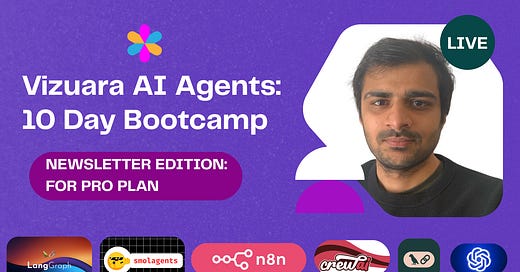Day 1 of the Vizuara AI Agents Bootcamp concluded on 21 June, 2025.
This is the first newsletter which covers the main takeaways from the lecture (only for Pro registered participants).
Table of content
Let us define AI Agents on our own
LLM and agents
Agency of agents
Main papers which have given rise to the field of agents
1. Can we define AI Agents on our own?
Imagine that you are a group of friends who are planning a trip to Spain. The trip is from 14th December till 21st December.
How will you go about planning this trip?
Here are some key points you might take into consideration:
Flights
Hotels
VISA
Places to visit
Job leave approval
You will need to take the following actions:
Book flights, book hotels to stay, book your VISA appointment and get your VISA, make a travel itinerary for every day and many other things.
Point A: You just discuss about this trip.
Point B: You have downloaded flight tickets, hotel bookings, VISA letter, travel itinerary and are ready to go.
Currently, you are at point A and you need to get to point B.
2. First attempt at the definition of an AI Agent
What if I tell you that you can automatically go from Point A to Point B.
How will you get there?
An AI Agent will help you reach there.
The first definition of an AI agent is that it takes you from point A to point B and it adds value to your life.
How can we quantify value? In this case, the agent saves you a huge amount of time.
Value can be either time or money or both.
3. But cars can also do that!
By our first definition, cars and planes can also take us from point A to point B, but they won’t be called as AI Agents.
We need to make our definition a lot more comprehensive.
Booking flights, searching for places to visit, making a travel itinerary are not easy actions to perform.
These actions require 2 aspects which an agent needs to be capable of:
Planning
Making decisions
If you want to decide the best flights, you need to decide whether a flight is out of your budget or not.
If you want to decide where to go on Day 2 of your trip after a day in Barcelona, you will need to plan the next day based on several factors like travel distance, interests of the group etc.
Let’s augment our definition of agents a bit more.
The second definition of an AI agent is that it takes you from point A to point B and it adds value to your life. While doing so, it can plan and make decisions.
4. But self-driving cars can also do that!
Self-driving cars take you from point A to point B. They can also plan and make decisions.
So we need to modify our definition more.
To plan and take actions, agents need access to certain tools.
To search for flights, agents need access to Google search engine:
To book hotels, agents need access to certain websites and their payment gateways:
To draft an email to our manager to request for the leave, agents need access to Gmail:
So: Agents need Tools!
We will define what tools are later, but for now, you can assume that tools are access to useful functionalities.
The third definition of an AI agent is that it takes you from point A to point B and it adds value to your life. It has access to tools and using those tools, the agent can plan and make decisions.
5. Large Language Models (LLMs)
Why have agents suddenly become so popular in the last couple of years?
The answer lies in a 2017 paper titled “Attention is All You Need”.
This paper had one figure on Page 3, called the transformer architecture.
The transformer architecture changed the field of language modeling.
Language models became massively better at understanding and responding to human language.
This new class of powerful language models came to be known as large language models (LLMs) because of their sheer size and number of parameters.
You already interact with one such LLM: ChatGPT.
What’s the link between LLMs and agents?
Agents use LLMs for planning, reasoning and decision making.
If LLMs were not good at language understanding, agents would not be able to plan and making decisions.
To decide the best flight from a webpage, the agent needs to understand what’s written on the webpage.
To draft an email to the manager, the agent needs to understand language and should know how to write.
The foundation of planning and decision making is understanding language.
This leads to the fourth definition of agents:
The fourth definition of an AI agent is that: Agents are LLMs which take you from point A to point B and add value to your life. Agents have access to tools and using those tools, the agent can plan and make decisions.
6. Final definition: The external environment and memory
What if the agent selects the wrong flight or drafts a wrong email?
The agent can receive feedback from the human and become better.
Agents interact with their environment (websites, humans and other tools) and keep getting better with time. This is because they have memory and can recall the actions they have taken in the past.
This leads to the fifth and final definition of agents:
The final definition of an AI agent is that: Agents are LLMs which take you from point A to point B and add value to your life. Agents have access to tools and using those tools, the agent can plan and make decisions. Agents learn from their environment and retain memory.
7. Agency and agents
The level of control or autonomy an agent has is called “agency”.
Lower the agency, lower is the value created by an agent.
Higher the agency, higher is the value created by an agent.
8. Main research papers behind AI Agents
Here is a list of 4 major papers which have contributed to so much development in the AI Agent field:
(2) Link to Paper 2
(3) Link to Paper 3
(4) Link to Paper 4





















